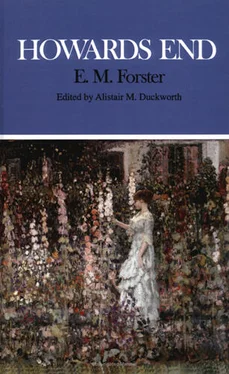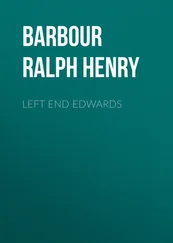Edward Morgan Forster - Howards End
Здесь есть возможность читать онлайн «Edward Morgan Forster - Howards End» весь текст электронной книги совершенно бесплатно (целиком полную версию без сокращений). В некоторых случаях можно слушать аудио, скачать через торрент в формате fb2 и присутствует краткое содержание. Жанр: Классическая проза, на английском языке. Описание произведения, (предисловие) а так же отзывы посетителей доступны на портале библиотеки ЛибКат.
- Название:Howards End
- Автор:
- Жанр:
- Год:неизвестен
- ISBN:нет данных
- Рейтинг книги:3 / 5. Голосов: 1
-
Избранное:Добавить в избранное
- Отзывы:
-
Ваша оценка:
- 60
- 1
- 2
- 3
- 4
- 5
Howards End: краткое содержание, описание и аннотация
Предлагаем к чтению аннотацию, описание, краткое содержание или предисловие (зависит от того, что написал сам автор книги «Howards End»). Если вы не нашли необходимую информацию о книге — напишите в комментариях, мы постараемся отыскать её.
Howards End — читать онлайн бесплатно полную книгу (весь текст) целиком
Ниже представлен текст книги, разбитый по страницам. Система сохранения места последней прочитанной страницы, позволяет с удобством читать онлайн бесплатно книгу «Howards End», без необходимости каждый раз заново искать на чём Вы остановились. Поставьте закладку, и сможете в любой момент перейти на страницу, на которой закончили чтение.
Интервал:
Закладка:
"Funny experiences seem to come to you two girls. No one's ever asked me about my—what d'ye call it? Perhaps I've not got one."
"You're bound to have one, but it may be such a terrible colour that no one dares mention it."
"Tell me, though, Miss Schlegel, do you really believe in the supernatural and all that?"
"Too difficult a question."
"Why's that? Gruyиre or Stilton?"
"Gruyиre, please."
"Better have Stilton."
"Stilton. Because, though I don't believe in auras, and think Theosophy's only a halfway-house—"
"—Yet there may be something in it all the same," he concluded, with a frown.
"Not even that. It may be halfway in the wrong direction. I can't explain. I don't believe in all these fads, and yet I don't like saying that I don't believe in them."
He seemed unsatisfied, and said: "So you wouldn't give me your word that you don't hold with astral bodies and all the rest of it?"
"I could," said Margaret, surprised that the point was of any importance to him. "Indeed, I will. When I talked about scrubbing my aura, I was only trying to be funny. But why do you want this settled?"
"I don't know."
"Now, Mr. Wilcox, you do know."
"Yes, I am," "No, you're not," burst from the lovers opposite. Margaret was silent for a moment, and then changed the subject.
"How's your house?"
"Much the same as when you honoured it last week."
"I don't mean Ducie Street. Howards End, of course."
"Why 'of course'?"
"Can't you turn out your tenant and let it to us? We're nearly demented."
"Let me think. I wish I could help you. But I thought you wanted to be in town. One bit of advice: fix your district, then fix your price, and then don't budge. That's how I got both Ducie Street and Oniton. I said to myself, 'I mean to be exactly here,' and I was, and Oniton's a place in a thousand."
"But I do budge. Gentlemen seem to mesmerize houses—cow them with an eye, and up they come, trembling. Ladies can't. It's the houses that are mesmerizing me. I've no control over the saucy things. Houses are alive. No?"
"I'm out of my depth," he said, and added: "Didn't you talk rather like that to your office boy?"
"Did I? —I mean I did, more or less. I talk the same way to every one—or try to."
"Yes, I know. And how much do you suppose that he understood of it?"
"That's his lookout. I don't believe in suiting my conversation to my company. One can doubtless hit upon some medium of exchange that seems to do well enough, but it's no more like the real thing than money is like food. There's no nourishment in it. You pass it to the lower classes, and they pass it back to you, and this you call 'social intercourse' or 'mutual endeavour,' when it's mutual priggishness if it's anything. Our friends at Chelsea don't see this. They say one ought to be at all costs intelligible, and sacrifice—"
"Lower classes," interrupted Mr. Wilcox, as it were thrusting his hand into her speech. "Well, you do admit that there are rich and poor. That's something."
Margaret could not reply. Was he incredibly stupid, or did he understand her better than she understood herself?
"You do admit that, if wealth was divided up equally, in a few years there would be rich and poor again just the same. The hard-working man would come to the top, the wastrel sink to the bottom."
"Every one admits that."
"Your Socialists don't."
"My Socialists do. Yours mayn't; but I strongly suspect yours of being not Socialists, but ninepins, which you have constructed for your own amusement. I can't imagine any living creature who would bowl over quite so easily."
He would have resented this had she not been a woman. But women may say anything—it was one of his holiest beliefs—and he only retorted, with a gay smile: "I don't care. You've made two damaging admissions, and I'm heartily with you in both."
In time they finished lunch, and Margaret, who had excused herself from the Hippodrome, took her leave. Evie had scarcely addressed her, and she suspected that the entertainment had been planned by the father. He and she were advancing out of their respective families towards a more intimate acquaintance. It had begun long ago. She had been his wife's friend, and, as such, he had given her that silver vinaigrette as a memento. It was pretty of him to have given that vinaigrette, and he had always preferred her to Helen—unlike most men. But the advance had been astonishing lately. They had done more in a week than in two years, and were really beginning to know each other.
She did not forget his promise to sample Eustace Miles, and asked him as soon as she could secure Tibby as his chaperon. He came, and partook of body-building dishes with humility.
Next morning the Schlegels left for Swanage. They had not succeeded in finding a new home.
Chapter 18
As they were seated at Aunt Juley's breakfast-table at The Bays, parrying her excessive hospitality and enjoying the view of the bay, a letter came for Margaret and threw her into perturbation. It was from Mr. Wilcox. It announced an "important change" in his plans. Owing to Evie's marriage, he had decided to give up his house in Ducie Street, and was willing to let it on a yearly tenancy. It was a businesslike letter, and stated frankly what he would do for them and what he would not do. Also the rent. If they approved, Margaret was to come up at once —the words were underlined, as is necessary when dealing with women—and to go over the house with him. If they disapproved, a wire would oblige, as he should put it into the hands of an agent.
The letter perturbed, because she was not sure what it meant. If he liked her, if he had manoeuvred to get her to Simpson's, might this be a manoeuvre to get her to London, and result in an offer of marriage? She put it to herself as indelicately as possible, in the hope that her brain would cry, "Rubbish, you're a self-conscious fool!" But her brain only tingled a little and was silent, and for a time she sat gazing at the mincing waves, and wondering whether the news would seem strange to the others.
As soon as she began speaking, the sound of her own voice reassured her. There could be nothing in it. The replies also were typical, and in the buff of conversation her fears vanished.
"You needn't go though—" began her hostess.
"I needn't, but hadn't I better? It's really getting rather serious. We let chance after chance slip, and the end of it is we shall be bundled out bag and baggage into the street. We don't know what we want , that's the mischief with us—"
"No, we have no real ties," said Helen, helping herself to toast.
"Shan't I go up to town today, take the house if it's the least possible, and then come down by the afternoon train tomorrow, and start enjoying myself. I shall be no fun to myself or to others until this business is off my mind."
"But you won't do anything rash, Margaret?"
"There's nothing rash to do."
"Who are the Wilcoxes?" said Tibby, a question that sounds silly, but was really extremely subtle, as his aunt found to her cost when she tried to answer it. "I don't manage the Wilcoxes; I don't see where they come in ."
"No more do I," agreed Helen. "It's funny that we just don't lose sight of them. Out of all our hotel acquaintances, Mr. Wilcox is the only one who has stuck. It is now over three years, and we have drifted away from far more interesting people in that time.
"Interesting people don't get one houses."
"Meg, if you start in your honest-English vein, I shall throw the treacle at you."
"It's a better vein than the cosmopolitan," said Margaret, getting up. "Now, children, which is it to be? You know the Ducie Street house. Shall I say yes or shall I say no? Tibby love—which? I'm specially anxious to pin you both."
Читать дальшеИнтервал:
Закладка:
Похожие книги на «Howards End»
Представляем Вашему вниманию похожие книги на «Howards End» списком для выбора. Мы отобрали схожую по названию и смыслу литературу в надежде предоставить читателям больше вариантов отыскать новые, интересные, ещё непрочитанные произведения.
Обсуждение, отзывы о книге «Howards End» и просто собственные мнения читателей. Оставьте ваши комментарии, напишите, что Вы думаете о произведении, его смысле или главных героях. Укажите что конкретно понравилось, а что нет, и почему Вы так считаете.












